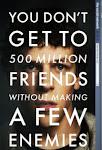Wednesday, May 30, 2012
Is a movie great because it makes a ton of money?
I read this post on a DVD site and thought it addressed an interesting question...
The modern movie community is box office-obsessed. Especially when something like Avengers comes along and starts shattering records, we follow it closely and marvel (no pun intended) at the film's popularity.
...but then inevitably somebody wants to rain on the parade and drops the word "inflation" or "tickets sold". But is that any better measure? Is there any way to truly compare films from different eras? Or are there just too many other factors? Let's break this down.
_________________________________________________
The first and most popular measure of a film's popularity is box office gross. But with ticket prices rising constantly, the addition of surcharges for IMAX and 3-D, and just the availability of more screens than ever before (so potential ticketbuyers aren't turned away due to sell-outs), that definitely skews the numbers in favor of modern films.
Then the question arises about including re-release $$ in the totals. Films like Avatar get rereleased with additional footage. Titanic, Phantom Menace, Lion King, etc get 3D re-releases. Do we discount that extra money?
Well if that's the case you'd also have to discount much of the money racked up by older films as well. Pretty much all films back then, especially the big ones like Gone With the Wind, left and came back to town constantly over years, since there was no such thing as home video, or television for that matter. Even moreso - Wizard of Oz, just as one example, besides coming and going many many times in the first couple years as part of its original release, also had re-releases in 1948, 1955, 1989, 1998, 2002, and 2009.
The point is, if youre going to discount anything but the very first release of a movie until it leaves theaters, you gotta apply the same rules to every other film from every era.
So what's the answer? Adjust for inflation or go by straight number of tickets sold? People love to cling to the inflation argument, but that does not make anything close to an accurate comparison. The fact is the average cost of a ticket in 1939 (Gone with the Wind) was 23 cents. 23 cents in 1939 translates to about $3.80 now. So even at the time, tickets were WAY cheaper. People were far more likely to plop down such a small amount to see a movie - several times even - whereas today high prices keep many people away, and certainly discourages many from multiple viewings. Can you imagine how many thousands or millions of more tickets a current movie like The Avengers would sell if tickets only cost $3.80??!?
How about competition (or lack thereof)? Back then a movie would play in a city and be the only movie in town...and if it was at all popular would remain there for weeks. As the only option in town in many cases, people saw whatever was there, so that again skews the popularity of a film.
Another factor that definitely impacts the numbers is home video. Back in early times, there was none. So you had to see it in theaters or you wouldn't get to see it at all. Now days people have that option, so many opt to wait. More and more as time goes on actually, as home theaters improve and theater-to-home windows shrink.
So how about we ignore tickets and box office. Can we judge by ratings? IMDb Top 250 and such offer lists of the top movies of all time, but those are so arbitrary they can't be definitive. For every serious cinephile who think Citizen Kane is a great film, there's a kid out there who think Twilight is "like, the grtest movie EVAR! 10/10!!!!!!!" So with everyone judging by their own criteria, any list voted on by the public is unreliable. Especially if they can vote more than once. Just look at something like The MTV Movie Awards to see how well that works. It's not a question of which movie people like best, it's which one has the craziest fans that will sit and vote thousands of times each.
How about letting the industry decide? Not just the Academy Awards, but like AFI for example has their AFI 100 list, and the National Film Registry does their thing every year. But then we're talking about a small group of people deciding what deserves the accolades, and here we're not even really talking popularity anymore, but perceived quality. Popular films are rarely considered the "best" films, so it's a whole different argument.
_________________________________________________
There are many other factors as well, but the bottom line is we can never truly compare films' popularity. Straight box office numbers certainly cannot tell the whole story, but tickets sold is no more fair or accurate than box office $$. We can have fun tracking records and such, but in the end its all meaningless and the only thing we can truly gauge is our own personal enjoyment of a particular film.
Subscribe to:
Comments (Atom)
Followers
Let the word go forth...
There are hundreds of alumni that might enjoy participating on this blog. Please help the site become a great place to discuss movies among friends by sending an invite to anyone who has graduated from AHS and might be interested - especially former Lit through Film students!



